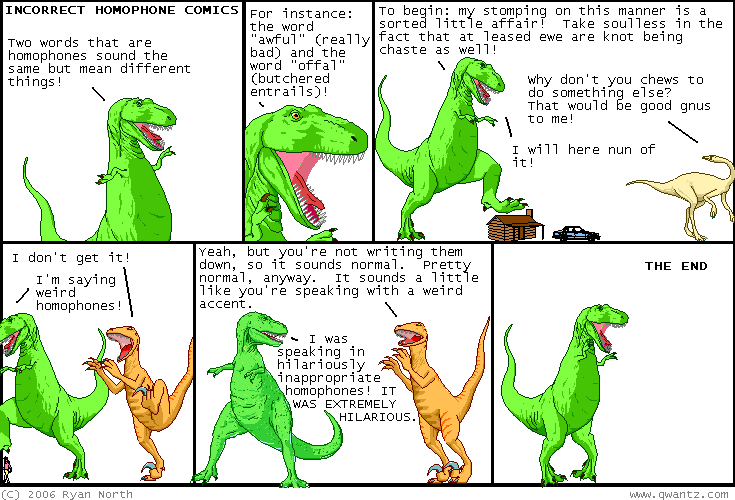More on "you can't pronounce spelling"--sort of, "you can't pronounce capitalization."
I'm head over heels for Terry Pratchett these days, and in his book "Thud," there is this exchange:
"You know, the dwarfs were listening for something underground? You wondered if someone was trapped right? But is there . . . I don't know . . . something dwarf-made that talks?"
Carrott's brow wrinkled.
"You're not talking about a cube, are you, sir?"
"I don't know. Am I? You tell me!"
"The deep-downers have some in their mine, sir,bu I'm sure there's none buried here. They're generally found in hard rocks. Anyway, you wouldn't listen for one. I've never heard of them talking when they are found. Some dwarfs have spent years learning how to use just one of them!"
"Good! Now: What Is A Cube?" said Vimes, glancing at his in tray. [leaving stuff out here] "It's, um . . . It's lik ea book, sir. Which talks. A bit like your Gooseberry, I suppose. Most of them container interpretatiosn of dwarf lore by ancient lawmasters. it's very old . . . magic, I suppose."
"Suppose?" said Vimes.
[I'm getting there--here is the pertinent part]
"Well, technomantic Devices look like things that are built, you know, out of--"
"Captain, you've lost me again. What are Devices, and why do you pronounce the capital D?"
Right there.
The capitals in "What Is A Cube" are there to indicate that Vimes stressed each word, probably pausing before each one of them--sort of a version of what I see lately: What. Is. A. Cube.
I suppose, Carrot would stress the word Device, and perhaps pausing slightly.
But it's an interesting idea--that you could pronounce a capital letter.
More on Pratchett's "Thudd"--there's a scene at the end where a dwarf interprets an old dwarfish recording (recorded on the cube or Device mentioned above) for modern English (Discwordish? Ankh-Morporkian?) speakers, and Pratchett represents the speech w/ "antique" spelling:
"Whoever is speaking a just said: 'Art thys thyng workyng?' "
The voice spoke again. As the cracked, old syllables unrolled, Bashfullsson went on: " 'The first thyng Tak did, he wroten hymself; the second thyng Tak did, he wroten teh Laws; the thyrd thyng Tak did, he wroten the World, the fourth thyng Tak did, he wroten ay cave; the fyfth thyng Tak did...."
Pratchett uses this spelling device for a couple of paragraphs, during the introduction part of the recording, and then switches into modern spelling.
But it made me wonder, how is "thyng" pronounced differently from "thing."
And it's a sign of my enjoyment of Pratchett's world and writing and humor that it doesn't bother me to have him do this.
If it were another writer, it would probably annoy me immensely.





